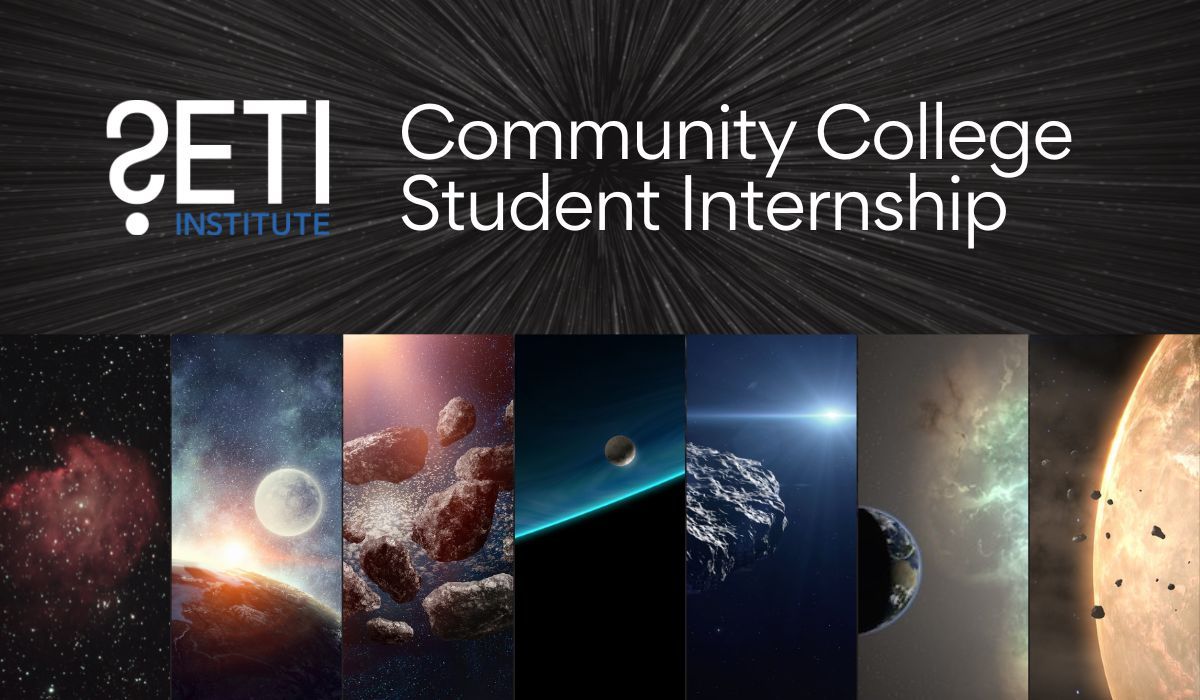
The SETI Institute, a scientific research center dedicated to the search for life in the universe, is pleased to offer three community college students the chance to intern with researchers during the spring semester, 2025. Currently, this opportunity is open to students at Diablo Valley College, Evergreen Valley College and Foothill College only.
The internship, for one [or two days] per week, will be in-person at the Institute’s Mountain View headquarters, or at the Unistellar Office, San Francisco. Travel expenses and a stipend will be provided. The online application can be found at seti.org/ccstemip; applications are now closed.
Students who have an interest in astronomy, data science, programming, mathematics, and outreach are encouraged to apply. For more information, contact Dr. Celso Batalha at Batalha@evc.edu (EVC) Dr. Jean Chiar at JChiar@dvc.edu (DVC) or Dr. Simon Steel (ssteel@seti.org) (Foothill).
Meet the SETI Institute
SETI (the Search for Extraterrestrial Intelligence) is the search for intelligent, alien civilizations. The SETI Institute was founded in 1984 to do just that, but in its 40-year history, it has expanded its scientific mission to search for all forms of life, from fossil microbes on Mars to hunting for habitable planets orbiting other stars in our galaxy. The Institute’s 100 researchers are experts in astronomy, chemistry, biology, engineering, and computing. While interning at the Institute, you will be able to meet and talk to the scientists and learn more about their amazing research as we get closer to answering one of the biggest questions of all: are we alone in the universe?
Meet the Scientists
Three SETI Institute scientists are interested in hosting an intern for the spring semester, 2025. While here, you will participate in their scientific research and outreach.
 Uma Gorti is mainly interested in star and planet formation. She is currently working on understanding how planet-forming disks evolve and develops models for comparisons with observations from telescopes such as the James Webb Space Telescope (JWST) and the Atacama Large Millimeter Array (ALMA).
Uma Gorti is mainly interested in star and planet formation. She is currently working on understanding how planet-forming disks evolve and develops models for comparisons with observations from telescopes such as the James Webb Space Telescope (JWST) and the Atacama Large Millimeter Array (ALMA).The project will involve using models of protoplanetary disks to understand and explain emission lines from different gaseous species seen with the James Webb Space Telescope. The student will look at how different emission lines scale with the water emission seen by JWST and how these relate to the evolutionary state of the disk as it forms planets. The work will involve data analysis and comparison of modeling and simulation results with observational data.
Her work is theoretical in nature, although she does connect her model results to data. For the project to be of any value to the student, the applicant would have to be thinking of pursuing higher degrees (at least a graduate from a 4-year university) in physics, astronomy, mathematics, or computer science. Some programming experience is necessary, either in Python or a higher-level language. A physics or math major is preferred, but anyone interested is encouraged to apply.
 Doug Caldwell is an astronomer searching for exoplanets – planets orbiting stars other than our sun. He works mainly with data from the Kepler and TESS (Transiting Exoplanet Survey Satellite) space telescopes, which have examined over a million stars and found thousands of planets, many as small or smaller than Earth. The results of Kepler and TESS have moved us from asking whether other Earths are out there to asking how we can search these planets for atmospheres and life.
Doug Caldwell is an astronomer searching for exoplanets – planets orbiting stars other than our sun. He works mainly with data from the Kepler and TESS (Transiting Exoplanet Survey Satellite) space telescopes, which have examined over a million stars and found thousands of planets, many as small or smaller than Earth. The results of Kepler and TESS have moved us from asking whether other Earths are out there to asking how we can search these planets for atmospheres and life.The work he envisions for the intern will be fairly computer intensive, but will start with mostly running existing programs and collecting/organizing results. The work will involve reviewing data analysis results to determine the validity of potential planet candidates, so an interest in astronomy and exoplanets is a plus. Hopefully, as the work progresses, the intern will be able to get more into programming/updating the data analysis code and work with a team to apply a machine learning system to review the analysis results. Experience with using the Linux/Unix operating system would be a big plus, but any computer experience and a willingness to learn is good. For programming, Python experience would be a plus but is not required.
 Franck Marchis is a senior planetary astronomer and chair of the exoplanet group at the Carl Sagan Center of the SETI Institute and Chief Scientific Officer and Founder at Unistellar. Marchis dedicates most of his energy to instruments capable of imaging and characterizing Earth-like exoplanets and is involved in education, public outreach, technology, and scientific investigations.
Franck Marchis is a senior planetary astronomer and chair of the exoplanet group at the Carl Sagan Center of the SETI Institute and Chief Scientific Officer and Founder at Unistellar. Marchis dedicates most of his energy to instruments capable of imaging and characterizing Earth-like exoplanets and is involved in education, public outreach, technology, and scientific investigations.This exciting internship offers a unique opportunity to be part of the Unistellar Citizen Science program's global outreach efforts. As an intern, you will assist in connecting with and expanding our network of citizen astronomers worldwide. Your role will be crucial in developing their interests through innovative engagement strategies and by facilitating collaboration with our team of professional astronomers. You will help design and implement a rewarding program and create compelling content for our website and app. This internship is ideal for students eager to contribute to a vibrant international community and gain experience in science communication and program development.





